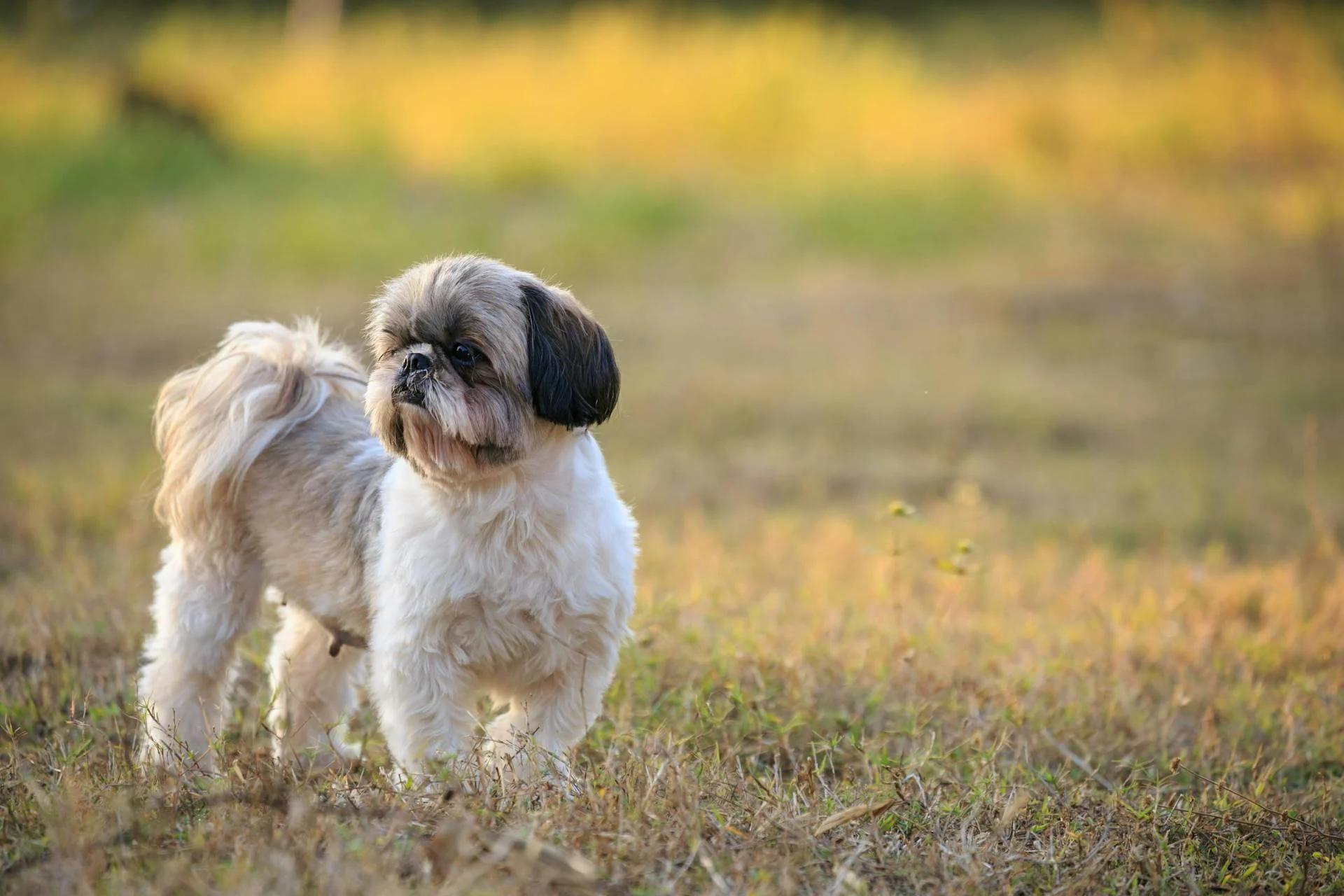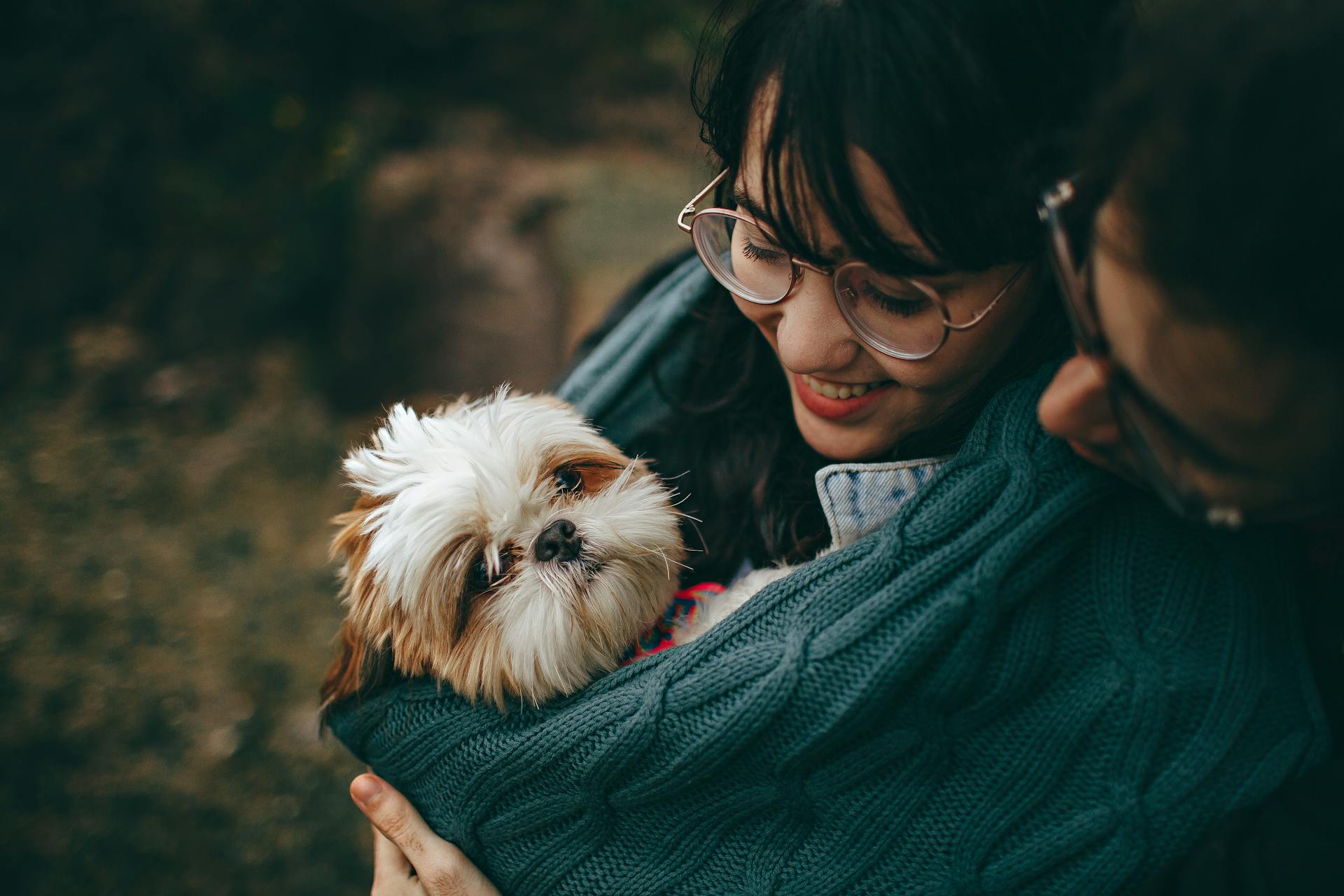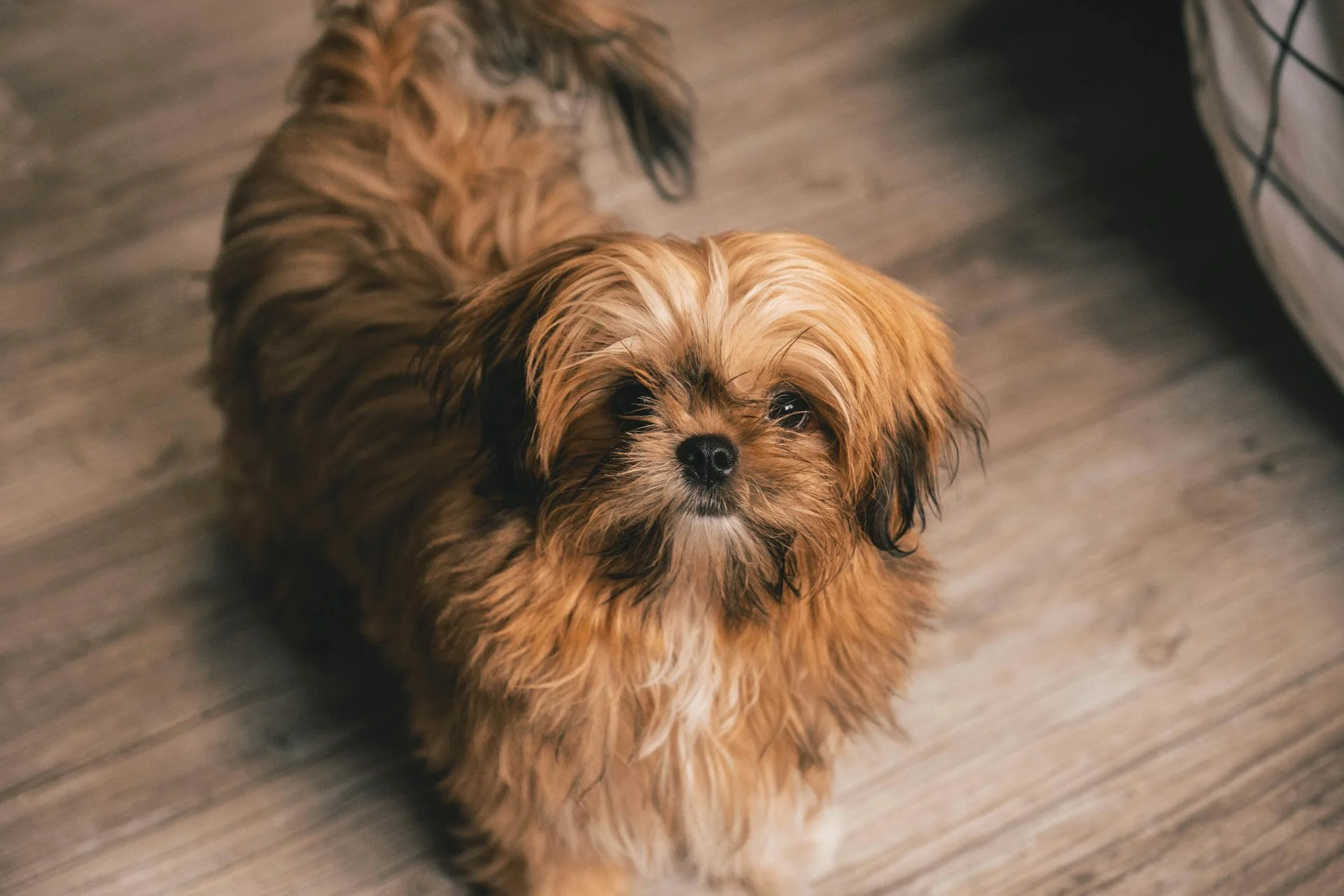
The Imperial Shih Tzu is a toy dog breed known for its friendly and outgoing personality.
They require regular grooming to prevent matting and tangling of their long coats.
A daily brushing session can help keep their coat in good condition.
Their small size makes them a great companion for apartment living.
Imperial Shih Tzus are prone to obesity, so it's essential to monitor their food intake and ensure they get plenty of exercise.
With regular care and attention, they can live up to 10-16 years.
Their friendly nature makes them a great choice for families with children.
Related reading: Are Maltese Dogs Friendly
Caring for a Shih Tzu
Caring for a Shih Tzu is a big responsibility, but with the right approach, it's a joy. They are generally happy and sociable with people and other animals of all ages and prefer not to spend their time alone.
Shih Tzu puppies need to be socialized at a young age to avoid anxiety, which can lead to bad behaviors like barking excessively or digging in your backyard.
A 30-minute walk and at-home playtime is usually enough exercise for a Shih Tzu, but they do love to be spoiled with attention and treats. They're quick to learn new tricks to get what they want.
Their long, luxurious double haircoat grows continuously and requires regular grooming to prevent tangling and matting. If left uncut, their fur can grow so long it drags on the ground.
Shih Tzu are brachycephalic, meaning they have a short, squished muzzle that can put them at a higher risk for overheating or heatstroke, so they need to stay out of the hot summer weather.
To keep their coat looking its best, Shih Tzu need to be brushed at least a few times a week, and preferably daily. Regular professional grooming is also a must to maintain their long hair coat or shave it into a cute Shih Tzu haircut.
Brushing their teeth every day with a dog-safe toothpaste and brush is also crucial for their dental health. Regular veterinary appointments will help monitor their mouth and recommend professional cleanings when necessary.
It's essential to find a home where their pet parents are willing to perform routine grooming and help them stay at a healthy weight. With the right care, Shih Tzu can thrive and make wonderful companions.
Readers also liked: Why Is My Shih Tzu Itching so Much
Health and Wellness
Imperial Shih Tzus are generally healthy, primarily when bred by an ethical breeder. They have a life expectancy of 10 to 16 years, although it is common for some dogs to live even longer.
Some common health concerns in Imperial Shih Tzus include otitis externa, or ear infections, and orthopedic problems. Brachycephalic syndrome and eye issues are also potential health concerns in this breed.
Here are some signs of eye problems in Imperial Shih Tzus:
- Red eyes
- Bulging eyes
- Eye discharge
- Rubbing the eyes
- Cloudy eyes
- Squinting
- Blindness
If you notice any of these symptoms, it's essential to contact a veterinarian for proper diagnosis and treatment.
Health Issues
The Shih Tzu breed is generally considered healthy, with an average lifespan of 10-18 years. However, they can be prone to certain medical conditions.
Their life expectancy can vary, with some living up to 16 years, and even longer in some cases. Unfortunately, even with proper breeding, Shih Tzus can still develop health issues.
Some common health concerns include otitis externa, or ear infections, and orthopedic problems. Brachycephalic syndrome, which affects the breathing, and eye issues are also common.
You might like: 100 Years Ago Original Boston Terrier

Eye problems can be quite painful and may include red eyes, bulging eyes, eye discharge, and even blindness. If you notice any of these symptoms, it's essential to contact a veterinarian.
Shih Tzus also require regular grooming to prevent eye irritation and tear staining. Keeping the area around their eyes clean and dry is crucial to avoid staining.
Here are some common eye problems that can affect Shih Tzus:
- Glaucoma
- Chronic dry eye
- Cataracts
If you're a Shih Tzu owner, it's essential to be aware of these potential health issues and take steps to prevent them. Regular veterinary check-ups and a healthy lifestyle can go a long way in keeping your furry friend happy and healthy.
Dental Care
Dental Care is a crucial aspect of your Shih Tzu's overall health and wellness.
Brushing your Shih Tzu's teeth daily with a dog-safe toothpaste and brush is essential. Regular veterinary appointments are necessary to monitor your dog's mouth and catch any potential issues early on.
Professional cleanings under anesthesia may be recommended by your vet if your Shih Tzu requires it.
Behavior and Training
Imperial Shih Tzus are people pleasers and usually easy to train, preferring high-reward treats and positive reinforcement.
They can be hard to housebreak and need lots of command repetition, so patience is a virtue you must uphold.
Firm and consistent training is essential, as this breed prefers play over training.
A few treats can make your training sessions more productive, especially since Imperial Shih Tzus are treat-motivated.
Their lower-than-average intelligence in work and obedience intelligence can make training challenging, but they have high adaptive intelligence.
They score high in their ability to learn from past experiences and have sharp instincts, which can help with training.
Their warm and charming personalities make up for their lower intelligence, with traits like loyalty, affectionateness, and friendliness.
They love cuddles and can easily make you forget the frustrating training sessions.
Check this out: Shih Tzu Good with Kids
Owning a Shih Tzu
Owning a Shih Tzu is a big responsibility, but it's also incredibly rewarding. They have a sweet disposition and need love and attention, making them wonderful companions due to their small stature, loyalty, and calm spirit.
Shih Tzus can be curious and dig if left unattended, so it's essential to monitor them closely in new or outdoor environments. They will still bark to alert you to someone or something new, just like their ancestors did.
To ensure your Shih Tzu stays happy and healthy, it's crucial to provide them with regular exercise and mental stimulation. Here are some fun activities you can do with your Shih Tzu:
- Neighborhood walks
- Backyard or indoor playtime
- Learning tricks
- Cuddling with family
Remember, Shih Tzus are social, friendly, and affectionate dogs that thrive on interaction with their family. With early training and socialization, they can make excellent family pets, adapting well to different settings and living arrangements.
Suitability of Dogs for Families
If you're considering bringing a Shih Tzu into your family, they make excellent pets due to their social, friendly, and affectionate personalities.
These dogs are generally well-behaved when trained and socialized early, which is a huge plus for families with kids. They're also very adaptable, thriving in both large homes with big yards and tiny urban apartments.
One of the best things about Shih Tzus is that they love to play and interact with their family. You can expect to spend quality time with your Shih Tzu through neighborhood walks, backyard or indoor playtime, and learning tricks together.
Shih Tzus are known to be cuddly and affectionate with all family members, including kids, and are hardly ever aggressive. They're polite with strangers, too, although they might bark or act aloof when they see a new face.
Here are some fun activities you can do with your Shih Tzu:
- Neighborhood walks
- Backyard or indoor playtime
- Learning tricks
- Cuddling with family
Owning Essentials
Owning a Shih Tzu requires attention to its grooming needs. Regular brushing is essential to prevent matting and tangling of its long coat.
Shih Tzus are social dogs and thrive on human interaction, so be prepared to spend quality time with your pet. They can become destructive if left alone for extended periods.
This breed is adaptable to living in small spaces, making them a great choice for city dwellers or those with limited living areas.
Nutrition and Diet
Imperial Shih Tzus have unique dietary requirements due to their small size, so it's essential to feed them a calorie-dense diet.
To ensure your Imperial Shih Tzu gets the right amount of calories, feed them a wet or semi-moist diet that contains smaller pieces for easy chewing and digestion.
A well-balanced diet is crucial for Imperial Shih Tzus, and it's recommended to feed them a twice-daily, balanced adult small-bite diet to avoid obesity.
Dry kibble is a good option for Imperial Shih Tzus as it can help reduce the risk of periodontal disease, but it's essential to choose a dental-specific diet for optimal dental health.
Shih Tzu puppies need to eat frequent meals, about three or four times a day, to avoid risks of hypoglycemia (low blood sugar).
High-fat, protein, and complex carbohydrate meals can help lessen the risk of low blood sugar issues in Shih Tzu puppies.
Your veterinarian can help calculate the right amount of calories for your Imperial Shih Tzu to avoid weight gain, so it's essential to consult with them when choosing a diet.
Imperial Shih Tzus require a diet with at least 18% protein and moderate amounts of calcium, fats, and fatty acids for optimal health.
Broaden your view: Shih Tzu Food List
Exercise and Activities
Exercise and activities are a great way to keep your Imperial Shih Tzu happy and healthy. Imperial Shih Tzus experience short bursts of energy that don’t last long.
Daily exercise is a must for your dog, and it can be as short as 15 to 20 minutes of physical stimulation to release pent-up energy. This can help them relax and recharge.
You can take your Imperial Shih Tzu on a neighborhood walk, which is a great way to get some exercise and sniff out new sights and smells. Backyard or indoor playtime is also a good option.
Learning tricks is another fun activity that can help mentally stimulate your dog. Cuddling with family is also a great way to bond with your Imperial Shih Tzu.
Grooming Guide
Imperial Shih Tzus are low shedders, but they require regular grooming to prevent matting and tangling.
Daily brushing is necessary to keep their luscious coat in good condition. Regular trimming of the hair around the eyes is also essential to prevent eye irritation.
Bathing your Imperial Shih Tzu every other month is a good routine to keep them clean. Brushing their teeth every other day is crucial to prevent dental issues.
Investing in quality nail clippers and clipping their claws at least once a month is a must. Regular grooming helps keep your Imperial Shih Tzu looking and feeling its best.
Shedding is minimal, but grooming needs are high, so be prepared to spend time brushing and trimming their coat.
You might enjoy: 6 Month Old Miniature Schnauzer
Frequently Asked Questions
How much is an imperial Shih Tzu worth?
An Imperial Shih Tzu's price ranges from $2,000 to $3,000, with some reputable breeders charging even higher. Learn more about the factors that affect the cost of this rare and adorable breed
What is the lifespan of a Imperial Shih Tzu?
The average lifespan of an Imperial Shih Tzu is 10 to 16 years. However, with proper care, some Imperial Shih Tzus have been known to live up to 18 years or more.
What is the difference between a Shih Tzu and an Imperial Shih Tzu?
The main difference between a Shih Tzu and an Imperial Shih Tzu is size, with Imperial Shih Tzus being significantly smaller, weighing between 4-9 pounds and standing 9 inches or shorter. This tiny breed is often referred to as a "teacup" Shih Tzu due to its miniature size.
How big are Imperial Shih Tzus?
Imperial Shih Tzus typically weigh between 5-6 pounds, making them a small to miniature version of the breed. This size range is often used to distinguish them from standard Shih Tzus.
What is the rarest Shih Tzu?
The rarest Shih Tzu color is blue, which is extremely rare and difficult to determine due to its varying shades.
Featured Images: pexels.com

